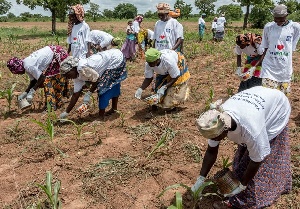 File photo: Women in Agriculture
File photo: Women in Agriculture
To make a real impact on food security and food production, agricultural spending and policy need to undergo a reorientation to focus more deeply on women farmers.
The Ministry of Food and Agriculture (MoFA) has been called upon to strategically target at least 30 percent women-participation in all agricultural-related programmes and projects.
This and other policy recommendations are captured in a baseline survey on gender and agriculture in selected agro-ecological zones of the country, based on indicators of the Gender and Agricultural Development Strategy (GADS) and the overall agricultural sector Monitoring and Evaluation Framework.
MoFA, through the Directorate of Women in Agriculture Development (WIAD), developed and launched GADs aimed at integrating and mainstreaming gender concerns into MoFA’s programmes. However, GADS was deficient of baseline data which is critical in providing the basis for measuring changes and progress in its implementation.
To this end, a survey was undertaken by GIMPA Consultancy Services in October 2014 as part of short-term technical assistance under the USAID/Ghana-funded Feed-the-Future Agricultural Policy Support Project implemented by Chemonics International Incorporated.
Key issues explored in the survey in line with the assignment were average agricultural land use sizes by gender; access to, control over, and ownership of productive resources disaggregated by gender. Others include: number of males and females employed by the agricultural sector, both primary and secondary; and sources and levels of incomes for diverse groups in the sector among a host of others.
Government was also urged to formulate and implement the necessary legislation and regulations to stop discrimination in land ownership and tenure against women. Government was urged to guarantee equal rights to land for men and women regardless of their civil status, and implement policies and programmes that facilitate women’s access to and control over land for agricultural purposes.
Additionally, extension services should be overhauled to make them gender-sensitive through increasing the number of female extension agents, setting up gender-sensitive learning and evaluation mechanisms among others.
The survey also found that both male and female farmers have extremely low access to credit, but women have even less access, the survey found. Government should consider establishing a women’s Enterprise Fund to help target credit to women farmers who cannot access credit facilities from the financial sector.